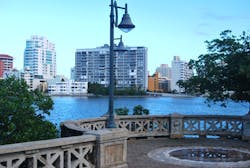Total Petroleum fined for industrial stormwater discharge violations by EPA
NEW YORK, NY, SEPTEMBER 14, 2016 -- The U.S. Environmental Protection Agency has reached an agreement with Total Petroleum Puerto Rico Corporation ("Total Petroleum") to settle the company's alleged violations of requirements to control pollution from stormwater discharges at its Guaynabo Bulk Fuels Terminal. Under the agreement, Total Petroleum is required to comply with the Clean Water Act’s stormwaterdischarge requirements associated with industrial activities and will pay a $345,000 penalty. The company will also invest $40,000 to construct and install approximately 30 artificial reef modules in the Condado Lagoon, which was recently designated as a nature reserve.
"Puerto Rico has extraordinary natural resources, including amazing water bodies and coastal ecosystems that are important places of recreation and tourist attractions," said Carmen Guerrero Pérez, the Director of the EPA’s Caribbean Environmental Protection Division. "Every company operating in Puerto Rico has an obligation to comply with the Clean Water Act so these water resources are not damaged and degraded."
The Clean Water Act requires that certain industrial facilities apply for and obtain National Pollutant Discharge Elimination System permits to control the discharge of pollutants carried out by stormwater runoff into nearby water bodies. These facilities must develop and implement a Storm Water Pollution Prevention Plan that details the best management practices that the company will follow to prevent stormwater runoff from washing harmful pollutants into local water bodies.
Without adequate on-site controls, stormwater runoff can flow directly to the nearest water body and can cause water quality damage such as siltation of rivers, beach closings, fishing restrictions, and habitat degradation. As stormwater flows over these facilities, it can pick up pollutants, including dirt or sediments, nutrients, trash, chemicals, and oils. Of particular concern is the uncontrolled runoff that can harm or kill fish and wildlife due to changes in water quality, hydrology, and other factors.
The EPA complaint alleges that Total Petroleum violated numerous stormwater requirements at its Guaynabo Bulk Fuels Terminal, such as failing to: implement best management practices; implement a Storm Water Pollution Prevention Plan; monitor and report discharge data of the facility’s discharges of pollutants; and obtain the appropriate stormwater discharge permit associated with industrial activity.
In addition to agreeing to come into compliance with the Clean Water Act and paying a penalty, Total Petroleum has also agreed to construct a new stormwater collection and discharge system at the Guaynabo Terminal, as well as submit an updated stormwater permit application for the facility. The company will also construct the third and final phase of the Condado Lagoon Taíno Coral Trail and Reef Enhancement Project, which is built in the northeastern reach of the Condado Lagoon’s outlet to the Atlantic Ocean.
Total Petroleum will install approximately 30 artificial reef modules to provide artificial habitats for reef species in the San Juan Bay Estuary. The purpose of this project is to enhance, protect, and promote marine life diversity in the Estuary System, which is designated as an estuary of national importance and is part of the EPA’s National Estuaries Program. Total Petroleum will invest a minimum of $40,000 for this project. The project, which benefits the environment and the community, is not required to bring the company into compliance.
The proposed consent decree has been lodged in the U.S. District Court for the District of Puerto Rico, and is subject to a 30-day public comment period and final court approval. A copy is available on the Department of Justice website at: http://justice.gov/enrd/Consent_Decrees.html.
